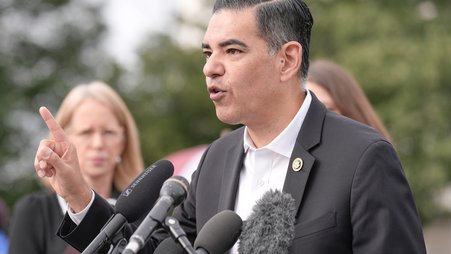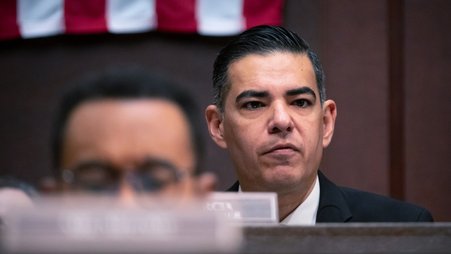
A recent decision from a D.C. appeals court requires reporter Catherine Herridge to face a contempt order before she can appeal a decision rejecting her claim of reporter’s privilege. “201215-D-BN624-0040” by Lisa Ferdinando is licensed under CC BY 2.0 DEED.
Reporters must risk fines or even jail time before they can appeal orders requiring them to name a confidential source, according to a recent decision from a federal appeals court in Washington, D.C.
The decision came as part of an order rejecting former Fox News and current CBS News reporter Catherine Herridge’s attempt to appeal a troubling lower court order requiring her to name a confidential source for her reporting about Yanping Chen, a Chinese American scientist. Chen is seeking Herridge’s source as part of her lawsuit against the FBI for violating the federal Privacy Act by allegedly leaking information about her.
The court said Herridge’s appeal was premature because she hadn’t yet been found in contempt of court for defying the order. (The Reporters Committee for Freedom of the Press has the complete legal lowdown on what the appeals court ordered.)
That may sound like a procedural technicality, but it’s dangerous. Requiring reporters to face contempt before they can appeal may discourage them from insisting on their First Amendment right to protect confidential sources by taking their objection to a higher court.
‘Friendly contempt’ a roll of the dice
Journalists are already under great pressure any time they face a legal demand to reveal a confidential source or other newsgathering material. If they can’t appeal an order requiring them to name a source without facing a potentially large fine or long jail sentence, some may think twice about continuing to resist.
This is especially true for freelancers or other journalists who don’t have the backing of a big news organization and may be on the hook for their own legal fees. As a result, some reporters may comply with orders to reveal sources even in cases they would have won on appeal.
It’s true that courts will often issue a “friendly contempt” order — imposing only a nominal fine — or put a contempt order on hold to allow the journalist to appeal. But reporters shouldn’t have to roll the dice and hope that the judge they’re before will be “friendly” to the press. There are plenty of judges with no love lost for the media, and no guarantee that their contempt order will be friendly.
For example, when Judge Vincent Gaughan ordered Chicago journalist Jim DeRogatis to testify in the 2008 criminal trial of singer R. Kelly on child pornography charges — despite DeRogatis’ invocation of a reporter’s privilege — DeRogatis tried to appeal before he was held in contempt. But an Illinois appellate court rejected his appeal, suggesting that DeRogatis should have sought a friendly contempt order first. (Freedom of the Press Foundation Director of Advocacy Seth Stern was one of the attorneys who worked on the appeal of the reporter's privilege ruling in the Kelly case.)
The only problem? Gaughan was known for his obvious disdain for the press and his battles with the news media over the almost complete secrecy with which he conducted some of Chicago’s biggest cases. He also had a reputation for losing his temper and had actually jailed spectators for contempt during the Kelly trial. (Gaughan later jailed a reporter in another case.) He’d also previously threatened to jail DeRogatis.
It’s not hard to see why DeRogatis may have doubted how “friendly” a contempt order from Gaughan would have been. (DeRogatis ultimately invoked the Fifth Amendment and was not forced to answer questions in the trial.)
Unfortunately, Gaughan is not the only judge who’s expressed or acted on anti-press sentiments. When reporters are ordered to name a confidential source, they shouldn’t have to take a chance that a judge will throw the book at them in order to appeal.
Contempt requirement completely unnecessary
Requiring a reporter to face contempt before they can appeal is also completely unnecessary. Contempt is meant to encourage someone to comply with a court order. If a reporter has made clear that she intends to appeal an order to reveal a confidential source, there’s no reason to actually impose a fine or jail sentence on her to try to force compliance with the order before the appeals process plays out.
Contempt orders serve no purpose in cases where a journalist invokes reporter’s privilege, and may actively undermine the exercise of First Amendment rights.
But the rule requiring a contempt order before an appeal isn’t inevitable. Some states take the more sensible approach of allowing reporters to appeal orders requiring them to testify or produce documents without waiting to be held in contempt. There’s no reason not to do the same in federal court.




